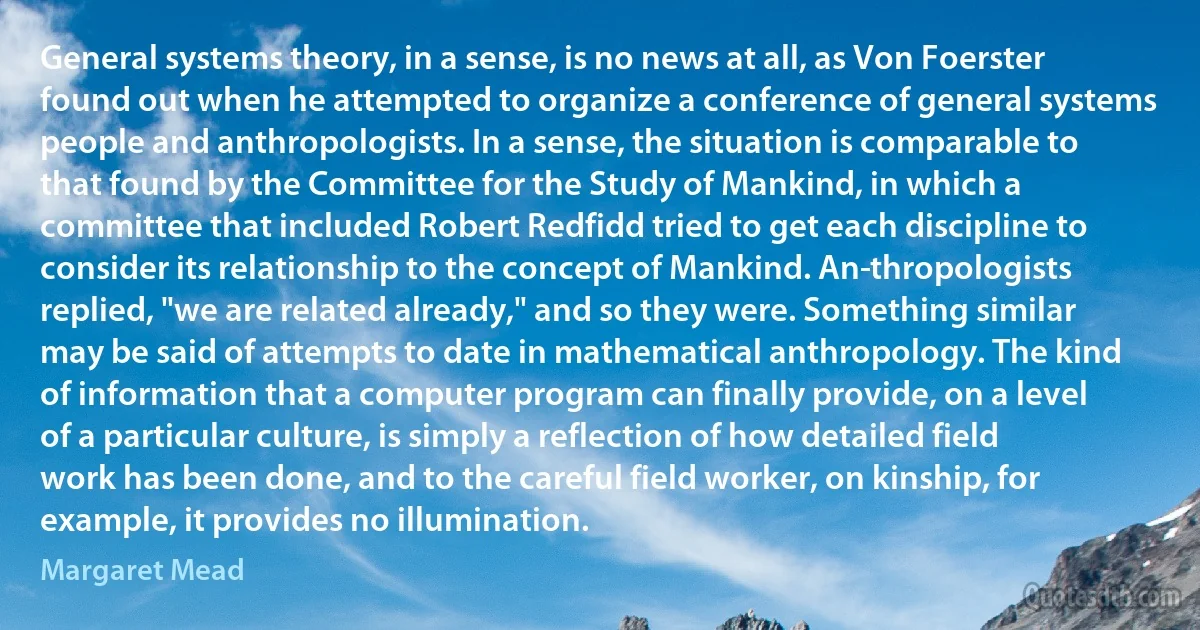
General systems theory, in a sense, is no news at all, as Von Foerster found out when he attempted to organize a conference of general systems people and anthropologists. In a sense, the situation is comparable to that found by the Committee for the Study of Mankind, in which a committee that included Robert Redfidd tried to get each discipline to consider its relationship to the concept of Mankind. Anthropologists replied, "we are related already," and so they were. Something similar may be said of attempts to date in mathematical anthropology. The kind of information that a computer program can finally provide, on a level of a particular culture, is simply a reflection of how detailed field work has been done, and to the careful field worker, on kinship, for example, it provides no illumination.
Margaret MeadRelated topics
anthropology committee comparable computer concept conference done example field found general kind news people reflection reply say sense situation something study try workRelated quotes
The need for a fundamentally different approach to the study of physical processes at the molecular level motivated the development of relevant statistical methods, which turned out to be applicable not only to the study of molecular processes (statistical mechanics), but to a host of other areas such as the actuarial profession, design of large telephone exchanges, and the like. In statistical methods, specific manifestations of microscopic entities (molecules, individual telephone sites, etc.) are replaced with their statistical averages, which are connected with appropriate macroscopic variables. The role played in Newtonian mechanics by the calculus, which involves no uncertainty, is replaced in statistical mechanics by probability theory, a theory whose very purpose is to capture uncertainty of a certain type.

George Klir
Contrary to what you may assume, I am not a pessimist but an indifferentist-that is, I don't make the mistake of thinking that the resultant of the natural forces surrounding and governing organic life will have any connexion with the wishes or tastes of any part of that organic life-process. Pessimists are just as illogical as optimists; insomuch as both envisage the aims of mankind as unified, and as having a direct relationship (either of frustration or of fulfilment) to the inevitable flow of terrestrial motivation and events. That is-both schools retain in a vestigial way the primitive concept of a conscious teleology-of a cosmos which gives a damn one way or the other about the especial wants and ultimate welfare of mosquitos, rats, lice, dogs, men, horses, pterodactyls, trees, fungi, dodos, or other forms of biological energy.

H. P. Lovecraft
The most promising lines of development of theory in the sociological and most immediately related fields, particularly the psychological and cultural, therefore, seem to be two-fold. One major direction is the theoretical elaboration and refinement of structural-functional analysis of social systems, including the relevant problems of motivation and their relation to cultural patterns. In this process, the structure of social action provides a basic frame of reference, and aspects of it become of direct substantive importance at many specific points. The main theoretical task, however, is more than a refinement of the conceptual scheme of the presently reprinted book - it involves transition and translation to a different level and focus of theoretical systematization.

Talcott Parsons
A great many individuals ever since the rise of the mathematical method, have, each for himself, attacked its direct and indirect consequences. ...I shall call each of these persons a paradoxer, and his system a paradox. I use the word in the old sense: ...something which is apart from general opinion, either in subject-matter, method, or conclusion. ...Thus in the sixteenth century many spoke of the earth's motion as the paradox of Copernicus, who held the ingenuity of that theory in very high esteem, and some, I think, who even inclined towards it. In the seventeenth century, the depravation of meaning took place... Phillips says paradox is "a thing which seemeth strange"-here is the old meaning...-"and absurd, and is contrary to common opinion," which is an addition due to his own time.

Augustus De Morgan
To consider the city as the projection of society on space is both an indispensible starting point and too elementary an approach. For, although one must go beyond the empiricism of geographical description, one runs the very great risk of imagining space as a white page on which the actions of groups and institutions are inscribed, without encountering any other obstacle than the trace of past generations. This is tantamount to conceiving of nature as entirely fashioned by culture, whereas the whole social problematic is born by the indissoluble union of these two terms, through the dialectical process by which a particular biological species (particularly because divided into classes) "man", transforms himself and transforms his struggle for life and for the appropriation of the product of his labour.

Manuel Castells
